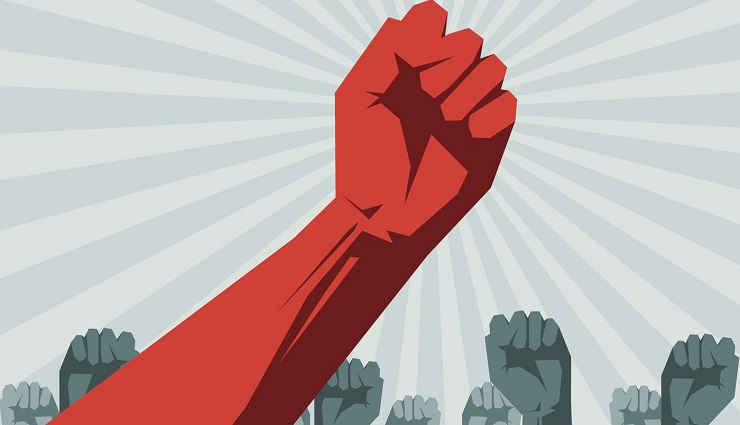Understanding the economic and political systems governing societies seems essential because policies affect our lives differently. The first step in this direction is to know the primary schools and approaches in politics and economics. Socialism is one of these schools of thought. This economic and political system is one of the most important and, of course, the oldest methods of societies and governments to determine approaches, resource management, and how the government interacts with the people. If the question has been raised for you, what does socialism mean, and you intend to get more information about this economic and political system, we suggest you stay with us in the rest of this article.
What is socialism?
Socialism, in simple terms, means a populist economic and political system based on collective, public, or joint ownership of the means of production. The means of production in this school of thought include factories, factories, and machines that are used to meet the basic needs of humans directly. Unique processes related to this collective ownership are carried out under the supervision of the central government body. According to the proponents of socialism, joint ownership of resources and central planning distributes goods and services more equally and extends justice throughout society.
Socialism is the opposite of capitalism. In a capitalist system, business owners own the means of production and pay wages to the workers who work with these means to produce goods and services. Meanwhile, in socialist systems, the working class owns and controls the means of production.
In a socialist system, all decisions related to production and distribution are made collectively. This process is directed under the supervision of a central planner or a particular government body. Also, labor cooperatives are a form of social production in this system. Socialist systems attempt to create robust welfare systems and social safety nets in which people rely on the government for everything from food to health care. In these systems, the government determines the amount of production and the price of goods and services.
What are the characteristics of socialism?
Joint ownership in socialism may be implemented through any government. Technocrats, oligarchy, totalitarian, and democratic governments can create a socialist system in the geographical area under their control.
The theories of the school of socialism foster lofty ideas to benefit the public. However, these systems’ practical challenges and poor performance records have made socialism an unattainable romantic ideal for many critics. One failed example of a socialist system was the Soviet Union, which collapsed in 1991.
However, proponents of socialism claim that this system will work if implemented correctly. They argue that socialism can provide equality and security. They also believe that in socialist systems, unlike the capitalist system, the value of each worker depends on the time he works and not on the matter he produces.
It is also worth noting that while socialism calls for collective or joint ownership of the means of production, individuals and families can still own personal-interest assets. Therefore, in these systems, the right of companies and factories is shared among the members of the society. However, assets such as houses and personal cars are still in the hands of individuals.
A look at the history of socialism
If we consider socialism a system based on shared resources and collective production, we must say that the first socialist systems were formed in the first human civilizations. Tribal societies often worked together for the common good to produce enough food and supplies for the entire population, and collective farming continued for thousands of years.

Also, the intellectual roots of socialism can be found in the book “Republic” by Plato and a few centuries later in “Utopia” by Thomas More. Both works describe a collective society in which people live and work together.
Of course, socialism in its current form was a direct response to the Industrial Revolution, which caused substantial economic and social changes in Britain and other parts of the world in the 18th and 19th centuries. As industrialists and capitalists became rich off the labor of poor and socially deprived workers, socialist ideas came to life as an alternative to capitalism to improve the lives of the working class.
The most famous and first socialist thinkers were Robert Owen and Henri de Saint-Simon, and later Karl Marx and then Vladimir Lenin. It is not harmful to point out that Lenin played a fundamental role in explaining and interpreting socialist ideas in Russia and the formation of this system at the national level after the 1917 revolution of this country.
After the failure of socialist systems in countries such as the former Soviet Union and Maoist China during the 20th century, many modern socialists proposed new concepts such as market socialism and democratic socialism, Which are modified forms of socialism. The main idea of these new types of socialism can be summed up as liberation from the relations governing the capitalist system.
Socialism, compared to other political and economic systems
To better understand socialism, comparing this political and economic school with different political and economic schools of thought is not bad.
1. The difference between socialism and capitalism
As mentioned earlier, socialism works opposite to capitalism or the free market. These two systems of thought consider an entirely different basis for property ownership and production structures.
In socialist economies, ownership and control of the means of collective production are managed, and only personal request for consumer goods is allowed. Also, in these systems, essential services such as health care, education, and public transportation are free and under government control, and their financial resources are provided through citizens’ taxes.
On the contrary, in a capitalist economy, private individuals and companies own the means of production and have the right to profit from them. Private property rights in the capitalist system are applied to almost all assets and are taken very seriously.
In a socialist economy, government officials are the primary planners and can control production, consumption, saving, borrowing, and investment behavior. In a capitalist economy, transactions are voluntary and often not directly controlled by the government. Therefore, unlike socialism, capitalism allows people to choose the amount of production, distribution, and consumption of goods and services. Also, in capitalism, unlike socialism, prices depend solely on the laws of supply and demand and are not determined by governments.
2. The difference between socialism and liberalism
Both the systems of socialism and liberalism (libertarianism) advocate the fair distribution of wealth, resources, and the ability of individuals to participate in society, and both systems oppose the oppression of people by elites or a small group of influential people. Also, both systems seek free and fair elections and defend leaders elected by the people’s votes.
However, liberalism focuses more on the benefit of individuals, while socialism emphasizes the general good of society. Liberalism seeks individuals’ economic, social, and political freedoms, but socialism aims to distribute economic, social, and political equality throughout the organization. So, in socialist systems, people no longer have control over decisions after choosing their economic and political leaders. At the same time, liberalism tries to provide individual decisions and civil liberties within the framework of the law to the members of society.

The original idea of socialism was to create a classless society and focus on the working class. Still, by recognizing different social types, liberalism tries to take more steps toward the middle class enjoying individual rights and allowing everyone to acquire and accumulate wealth.
3. The difference between socialism and communism
Communism and socialism both belong to left-wing schools of thought and are anti-capitalist. Both schools of thought support public and collective ownership of the means of production, distribution, and exchange of goods. Both socialism and communism believe capitalism and the free market create a widening gap between rich and poor by exploiting workers.
However, socialism predates communism by several decades. Communism was formed by the famous and influential work of Karl Marx and Friedrich Engels called “The Communist Manifesto” in 1848. Communism can be considered a stricter version of socialism. In communism, all assets are communally owned, without private ownership. As mentioned earlier, in socialist systems, people can still own personal property.
How governments and systems are formed is another example of the difference between communism and socialism. According to Karl Marx’s prediction, violent labor uprisings against the middle and upper classes could lead to a communist government. Meanwhile, socialists often seek change and reform without subverting the dominant social and political structure.
Moreover, in communist systems, workers get whatever they need in kind. But in the theory of socialism, workers should be rewarded for their contribution to the economy.
4. The difference between nationalism and socialism
Socialism and nationalism (nationalism) share many assumptions and can even coexist within political or national groups. Both theories support belonging to a specific society and emphasize collective identity. Also, both approaches are based on collective action and social changes at the national level. However, the degree of flexibility of these two intellectual systems in economic and political processes has fundamental differences.
Socialism aims to achieve economic and social equality by supporting collective ownership of resources and emphasizing the working class’s welfare. Nationalism seeks to promote and protect the interests, identity, and autonomy of a particular nation or ethnic group. Nationalism emphasizes preserving culture, language, and national heritage and can manifest in various economic systems, including socialist systems.
Socialism calls for universal solidarity among the working class and often groups and international assemblies that strive for social and economic justice. Nationalism prioritizes national self-determination and may lead to isolationist policies of governments.
Some fundamental differences between socialism and nationalism are ideological goals, economic systems, the degree of focus on social equality, and the approach to international relations.
What countries are socialist?
After the collapse of the Soviet Union in the 90s, few countries have earnestly sought to implement this economic and political system. However, we should not ignore that streaks of socialist thinking and ideas can still be seen next to other political and economic views, and even in capitalist countries such as the United States of America, they have supporters among the powerful and policymakers.
In general, although the number of countries that operate based on purely socialist systems is not very high, we can still mention governments that try to use these ideas to arrange their political and economic systems.
China is perhaps the most prominent example of a socialist country governed by a government based on communist ideas. Although, in practice, many important industries in China are under the control of the government, in recent years, this country has moved towards capitalism and market liberalization in special economic zones such as Shanghai. Accordingly, cooperation between private companies has increased recently in this country, and now, a large part of China’s economy and GDP is provided by private businesses.
Cuba is another country that formed a socialist economy based on Marxist-Leninist ideas after its communist revolution in 1959 and the rise of Fidel Castro. Of course, in this country, after the death of Castro, we witnessed some economic and political liberalization. For example, in 2019, Cuban citizens voted for a new constitution that, while maintaining a socialist political system, promotes private property rights and makes free markets more accessible.
The last Marxist-Leninist socialist economy that has not made any reforms is North Korea. This country is still a communist dictatorship with some central power controlling everything. Laos and Vietnam are other Asian countries considered socialist, but they are politically and economically more open than North Korea.
last word
Socialism is an economic and political system centered on collective ownership of means of production and is the opposite of capitalism. In socialist systems, the government makes all decisions regarding producing and pricing goods and services. Proponents of socialism believe that this leads to a more equal distribution of goods and services and creates a more just society without class differences. What is your opinion? Do you also believe that if countries and governments implement the principles of socialism correctly, they can achieve a utopia for all people?
We look forward to reading your ideas and thoughts in the comments section of this article.



